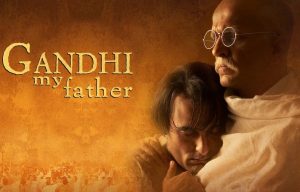With the release of Animal depicting a man’s obsessive love for his father, enough to create mayhem around when he feels he is threatened, it would be interesting to probe the father-son relationship in Bollywood films, Shoma A. Chatterji writes
 German novelist Franz Kafka in his book Letter to My Father addresses his father thus: “What was always incomprehensible to me was your total lack of feeling for the suffering and shame you could inflict on me with your words and judgments.”
German novelist Franz Kafka in his book Letter to My Father addresses his father thus: “What was always incomprehensible to me was your total lack of feeling for the suffering and shame you could inflict on me with your words and judgments.”
Kafka goes on to say that the hostility his father displayed against him when he was a child affected him later in life. “My father’s method of upbringing had saddled me with a general load of fear, weakness and self-contempt.”
Many sons grow up without having an affectionate bond with their fathers, which remains till later years. The warmth of a relationship between father and son goes missing, for whatever reason. Many Bollywood films reflect on this aspect.
But then there is the opposite too. Think of Animal where a son’s almost obsessive love for his father makes him break every rule in the book. He can be an ‘animal’ who can kill hundreds of people at one go because he feels they are threats to his father’s life. The title Animal, however, is a complete misnomer and an insult to the animal kingdom. That the film is a box office hit is only a reflection of the violent times we live in today.
On this strand, let us look at some other father-son centric films coming out of Bollywood.
 Gandhi, My Father (2007) directed by Feroz Abbas Khan is a powerful recreation of the failed relationship that persisted between Mahatma Gandhi and Harilal Gandhi, the eldest of his four sons. “Dear Bapu,” wrote Harilal to his father once. “In your laboratory of experiments, unfortunately, I am the one truth that has gone wrong…” Elsewhere, he said, “He is the greatest father you have…but he is the one father I wish I did not have.” As for Gandhi, he once said, “The greatest regret of my life… Two people I could never convince – my Muslim friend Mohammed Ali Jinnah and my own son Harilal Gandhi.”
Gandhi, My Father (2007) directed by Feroz Abbas Khan is a powerful recreation of the failed relationship that persisted between Mahatma Gandhi and Harilal Gandhi, the eldest of his four sons. “Dear Bapu,” wrote Harilal to his father once. “In your laboratory of experiments, unfortunately, I am the one truth that has gone wrong…” Elsewhere, he said, “He is the greatest father you have…but he is the one father I wish I did not have.” As for Gandhi, he once said, “The greatest regret of my life… Two people I could never convince – my Muslim friend Mohammed Ali Jinnah and my own son Harilal Gandhi.”
Udaan (2010) directed by Vikramaditya Motwane, is one of the most brutal depictions of a father-son relationship gone sour. Son Rohan, 17, cannot understand how he can please his father who is least interested in his two sons born of two different wives. Rohan is a rebel and is forced to come to live with his father when his boarding school sends him ‘home’.
He finds it impossible to cope with the environment he has to live in with a six-year-old little step brother Arjun to take care of. Rohan discovers that his father’s understanding of fatherhood is to keep his sons under strict military-like discipline. The communication lines between the father and his two sons are broken beyond repair and when Rohan is pushed against the wall, he takes his little brother with him and quits.
Sarkar (2005) directed by Ram Gopal Varma is a crime thriller where the family narrative of a father’s relationship with his two sons raises questions of morality and power struggle. Father Subhash Nagre is the ‘Godfather’ of a mafia in the city. Which of the two sons will succeed him to the ‘throne’ of the underworld the old man commands? He chooses the younger son because he is the quiet, obedient one while the elder one is greedy for power joins the opposite camp. Can quiet submission by a son to his dictatorial father express a loving relationship between them? Does this justify the father commanding his younger son to get rid of his own brother? Where does fatherhood come in this tug-of-war for power?
Dear Dad (2016) directed by Tanuj Bhramar explores the fragile territory of father Nitin Swaminathan (Arvind Swamy) opening up to his son about his being a gay man. The road movie shot in scenic mountainous spots in and around Mussourie at first unfolds the story of a happy, seemingly normal family but soon falling apart when the patriarch decides to come out of the closet. He takes off on a journey, both introspective and literal, with his teenage son Shivum (Himanshu Sharma). For most of the 90-minute soul-searching excursion, the director gives his characters room to breathe easy.
In Shakti by Ramesh Sippy before succumbing to his injuries Vijay tells his father that he tried his best to stop loving him but failed. “Why?” he asks his father, as he lay in death throes in the older man’s arms. As answer, his father says, “Because I too loved you very much, my son.” Phir kaha kyon nahin Dad” – then why didn’t you tell me Dad? Vijay asks. This complete breakdown of communication between father and son in Shakti defines the tragedy of the story. In fact, that is the story.
Trans World Features
(Credit to author and TWF mandatory)



